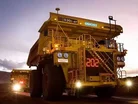[SLIDESHOW] Driverless Trucks in Action

Autonomous haulage is one of the most exciting new trends to hit the mining industry. The utilization of driverless trucks provides companies such as Rio Tinto and BHP Billiton with predictable operations. This translates to enhanced safety with fewer collisions and the ability to eliminate risk of human error and fatigue.
"By eliminating those mundane, often dangerous jobs, you create safer and more sophisticated jobs," says Director of Iron Ore Research Pty Ltd. Philip Kirchlechner
In addition, autonomous vehicles have an immense amount of efficiency benefits. The trucks can operate around the clock with more consistent cycle times at lower costs per ton.
“It should introduce a lot more hours onto the machines, so you can actually use the machinery much more because you don’t need lunch breaks, you don’t need crib times or shift changes,” said Tim Day, automation manager at BHP Billiton’s new Jimblebar mine in Australia.
Employees who would have been sent off to the remote mining site locations can now operate close to home. The automated machines can be controlled from a safe distance.
"We have to do things smarter, we have to use technology to raise productivity, and that's going to touch on a whole spectrum of mining," Kirchlechner said.
Along with lower costs, safer initiatives and production increases, autonomy can provide mining companies with lower margin mines that, in the long run, will increase the economically viable mineral resources and reserves globally.
- Green mining market set to grow exponentially in 2023Sustainability
- Newmont’s Boddington to become world’s first autonomous gold mineTechnology
- BHP hits halfway mark with South Flank, Pilbara mine constructionSmart Mining
- BHP releases world’s first LNG-fuelled freight tender for shipping iron oreSustainability



